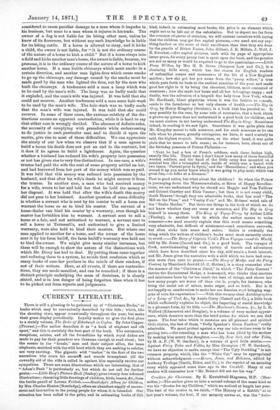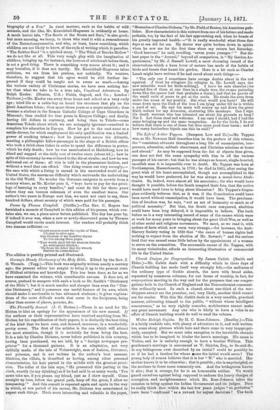Crrwksrs for Christmas. By E. Knatehimil-Hugessem M.P. (Mac- millan.)—The author
gives us here a second volume of the same kind as was his "Stories for my Children," which we noticed at length last year. The best of the stories is, we think, "The History of a Rabbit," a3 in last year's volume, the best, if our memory serves us, was the "Auto-
biography of a Fox." In rural matters, such as the habits of wild animals, and the like, Mr. Knatchbull-Hugessen is evidently at home. A mock heroic tale, "The Battle of the Stoats and Rats," is also good; but more amusing, we fancy, to those who read it with a remembrance of the Batrachomyomachia, and who, at least, know something, which children are not likely to know, of the style of writing which it parodies. "The Robber Band" is a spirited story. " The Witch of Brooke Hollow" we do not like at all. This very rough play with the imagination of children, bringing up, for instance, the horrors of witchcraft before them, is not a good thing. Thera is something very coarse about it ; and it may brutalize, if it does not terrify. Mr. Knatchbull-Hugessen takes criticism, we see from his preface, not unkindly. We venture, therefore, to suggest that his ogres would be still farther im- proved if they could be taught not to swear so muck—Among the various variety of Christmas stories, we have seen nothing bet- ter than what we take to be a true tale, Vagabond Adventures. By Ralph Keeler. (Boston, U.S.: Fields, Osgood, and Co. ; London : Triibner.)—Mr. Keeler ran away from home and school at a very early age ; tried life as a cabin-boy on board the steamers that ply on the
great American lakes ; then spent three years as a negro minstrel; then became a student in the Roman Catholic College of Cape Girardeau in Missouri ; then studied for four years in Kenyon College ; and finally, having 181 dollars in currency, and being then in Toledo—some American Toledo about which we are unhappily ignorant—resolved to complete his education in Europe. How he got to the east coast as a cattle-drover, for which employment his only qualification was a limited power of smoking tobacco ; how he journeyed across the Atlantic, meeting a philosophic fellow-passenger in the shape of a British officer who took a third-class ticket in order to spend the difference in porter, which he duly drank ; how he was matriculated at Heidelberg, how he dined and supped at the daily cost of twelve cents (about 6d.); how in spite of this economy he was reduced to the direst straits; and how be was delivered out of them ; all this is told in the pleasantest fashion, and without a word that can offend: One thing comes out very strongly,— the ease with which a living is earned in the uncrowded world of the United States, the enormous difficulty which surrounds the undertaking in the Old World. No wonder the Germans emigrate in crowds from a country where, as Mr. Keeler puts it, " boys have to pay for the privi- lege of learning to carry bundles," and must do this for three years before they can become salesmen of even the smallest wares. Our author's two years in Europe cost him, we must not omit to say, three hundred dollars, about seventy of which were paid for his passages.



































 Previous page
Previous page